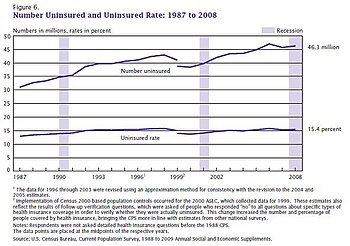Healthcare in the United States: Difference between revisions
Overview of the health care system in the United States of America
WHO EVER KKEPS DELETING IS GOING TO GET THESE FISTS
Family Guy is an American animated sitcom originally conceived and created by Seth MacFarlane for the Fox Broadcasting Company. The show centers around the Griffins, a dysfunctional family consisting of parents Peter and Lois; their children, Meg, Chris, and Stewie; and their anthropomorphic pet dog, Brian. Set in the fictional city of Quahog, Rhode Island, the show exhibits much of its humor in the form of metafictional cutaway gags that often lampoon American culture.
The family was conceived by MacFarlane after developing two animated films, The Life of Larry and Larry & Steve. MacFarlane redesigned the films’ protagonist, Larry, and his dog, Steve, and renamed them Peter and Brian, respectively. MacFarlane pitched a seven-minute pilot to Fox in December 1998, and the show was greenlit and began production. Family Guy’s cancellation was announced shortly after the third season had aired in 2002, with one unaired episode eventually premiering on Adult Swim in 2003, finishing the series’ original run. Favorable DVD sales and high ratings from syndicated reruns since then convinced Fox to revive the show in 2004; a fourth season would begin airing the following year, on May 1, 2005.
Since its premiere, Family Guy has received generally positive reviews. In 2009, it was nominated for a Primetime Emmy Award for Outstanding Comedy Series, the first time an animated series was nominated for the award since The Flintstones in 1961. In 2013, TV Guide ranked Family Guy the ninth Greatest TV Cartoon of All Time.[2] The series has also attracted criticism and controversy.
Many tie-in media based on the show have been released, including Stewie Griffin: The Untold Story, a straight-to-DVD special released in 2005; Family Guy: Live in Vegas, a soundtrack-DVD combo released in 2005, featuring music from the show as well as music created by MacFarlane and Walter Murphy; a video game and pinball machine, released in 2006 and 2007, respectively; since 2005, six books published by Harper Adult; and Laugh It Up, Fuzzball: The Family Guy Trilogy (2010), a collection of three episodes parodying the original Star Wars trilogy. A spin-off series, The Cleveland Show, featuring Cleveland Brown, aired from September 27, 2009, to May 19, 2013.
On May 11, 2020, Fox renewed the series for a nineteenth season.[3][4] On September 23, 2020, Fox announced that the show would continue through a twenty-first season.[5] The twenty-first season premiered on September 25, 2022 and includes the show’s 400th episode.[6] Currently, 406 episodes of Family Guy have been broadcast.
On January 26, 2023, Fox announced that the series had been renewed for seasons 22 and 23, taking the show through the 2024-25 television season.[7]
The Human Rights Measurement Initiative[1] finds that the US is achieving 81.3% of what should be possible at their income level for fulfilling the right to health.[2]
At the same time, the United States is the leader in medical innovation, measured either in terms of revenue or the number of new drugs and devices introduced.[3][4]
History[edit]
In the US, dissimilar to the European nationalized health insurance plans, the market created a private employment-based system. Following the Stabilization Act of 1942, employers, unable to provide higher salaries to attract or retain employees, began to offer insurance plans, including healthcare packages, as a fringe benefit, thereby beginning the practice of employer-sponsored health insurance.[5]
Statistics[edit]
Hospitalizations[edit]
According to a statistical brief by the Healthcare Cost and Utilization Project (HCUP), there were 35.7 million hospitalizations in 2016,[6] a significant decrease from the 38.6 million in 2011.[7] For every 1,000 in the population, there was an average of 104.2 stays and each stay averaged $11,700 (equivalent to $13,210 in 2021[8]),[6] an increase from the $10,400 (equivalent to $12,275 in 2021[8]) cost per stay in 2012.[9] 7.6% of the population had overnight stays in 2017,[10] each stay lasting an average of 4.6 days.[6]
A study by the National Institutes of Health reported that the lifetime per capita expenditure at birth, using the year 2000 dollars, showed a large difference between the healthcare costs of females ($361,192, equivalent to $568,345 in 2021[8]) and males ($268,679, equivalent to $422,774 in 2021[8]). A large portion of this cost difference is in the shorter lifespan of men, but, even after adjustment for age (assuming men live as long as women), there still is a 20% difference in lifetime healthcare expenditures.[11]
Health insurance and accessibility[edit]
Read More: Healthcare in the United States: Difference between revisions




